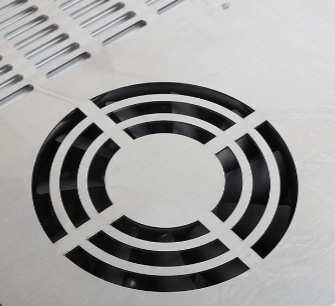Convenient and Practical: Exploring the Benefits of Frameless Servo Motors
Pubblicato 2024-03-18 03:09:54
0
6K

Introduction:
In the realm of industrial automation, the drive for compactness, flexibility, and high performance has become increasingly important. One key component that fulfills these requirements is the frameless servo motor. In this article, we will delve into the functionalities and advantages of the frameless servo motor, showcasing its relevance and utility in various applications.
What is a Frameless Servo Motor?
A frameless servo motor, as the name suggests, is a type of motor that lacks an external frame. Unlike traditional servo motors, they consist of a rotor and stator without any additional housing or mechanical structure. The rotor is directly attached to the driven load, while the stator is usually mounted in the system structure. The absence of a frame makes these motors highly compact and lightweight, providing several unique benefits.
1. Space and Weight Optimization:
Frameless servo motors are specifically designed to optimize space and weight constraints. By eliminating the external frame, the overall size and weight of the motor are significantly reduced. This makes them ideal for applications where limited space is available, such as robotic arms, medical equipment, and aerospace systems. The compact nature of frameless servo motors also enhances overall system performance by reducing inertia and improving dynamic response.
2. Flexible Integration:
The frameless design of these servo motors allows for seamless integration into various mechanical structures. They can be easily incorporated into existing systems or custom configurations, enabling adaptability to different applications. The absence of a dedicated housing also simplifies the installation process and facilitates maintenance and repairs. Additionally, frameless servo motors can be fitted with different types of feedback devices, such as encoders or resolvers, to ensure accurate positioning and control.
3. Enhanced Thermal Management:
icient thermal management is essential for the longevity and performance of servo motors. Frameless servo motors offer good thermal dissipation capabilities due to their direct integration with the load. In traditional motors, heat is generated within the frame, leading to increased temperatures and potential performance degradation. However, the frameless design allows for direct heat transfer to the load, preventing overheating issues and ensuring reliable operation even in demanding environments.
4. High Torque and Precision:
Despite their compact size, frameless servo motors exhibit impressive torque capabilities and precision. The direct integration of the rotor and load results in enhanced power transmission and improved torsional rigidity. This enables accurate and efficient motion control, making them well-suited for applications that require high precision and dynamic responsiveness. Industries such as robotics, CNC machining, and automation greatly benefit from the good torque and precision offered by frameless servo motors.
5. Cost-Effective Solution:
Frameless servo motors provide a cost-effective solution compared to traditional servo motors. The absence of an outer frame reduces material and manufacturing costs, making frameless designs more affordable. Furthermore, their lightweight construction contributes to lower shipping and handling expenses. With their compact form factor and high performance, frameless servo motors offer an great balance between cost-efficiency and functionality.
Conclusion:
The frameless servo motor represents a convenient and practical solution for industries seeking compactness, flexibility, and high performance in their automation systems. With their space-saving design, flexible integration options, enhanced thermal management, high torque, and precision, as well as cost-effectiveness, frameless servo motors are gaining popularity across various domains. Whether in robotics, medical equipment, or industrial automation, these motors provide a reliable and efficient solution for achieving good motion control.
Cerca
Categorie
- Art
- Causes
- Crafts
- Dance
- Drinks
- Film
- Fitness
- Food
- Giochi
- Gardening
- Health
- Home
- Literature
- Musica
- Networking
- Altre informazioni
- Party
- Religion
- Shopping
- Sports
- Theater
- Wellness
Leggi di più
Destiny Painting – Professional Cabinet Painting Tacoma
Cabinets are often the focal point of any kitchen, bathroom, or office, and a...
America's Digital Defenses: 25 Years of Neglect
America's digital defenses remain compromised
by an unaddressed vulnerability dating back to...
Die besten Strategien zum FC 25 Spieler kaufen: Preisanalyse und Tipps für EA FC 25 Spielerpreise
Die besten Strategien zum FC 25 Spieler kaufen: Preisanalyse und Tipps für EA FC 25...
**Comment acheter des crédits FC 26 et maximiser votre expérience de jeu avec l'achat de FIFA Coins**
Comment acheter des crédits FC 26 et maximiser votre expérience de jeu avec l'achat...
Ultimate Guide to Buying Coins FIFA: Maximize Your FC 26 Coin Investment
Ultimate Guide to Buying Coins FIFA: Maximize Your FC 26 Coin Investment
If you're an...
© 2025 Scenario.press - libera espressione
 Italiano
Italiano


